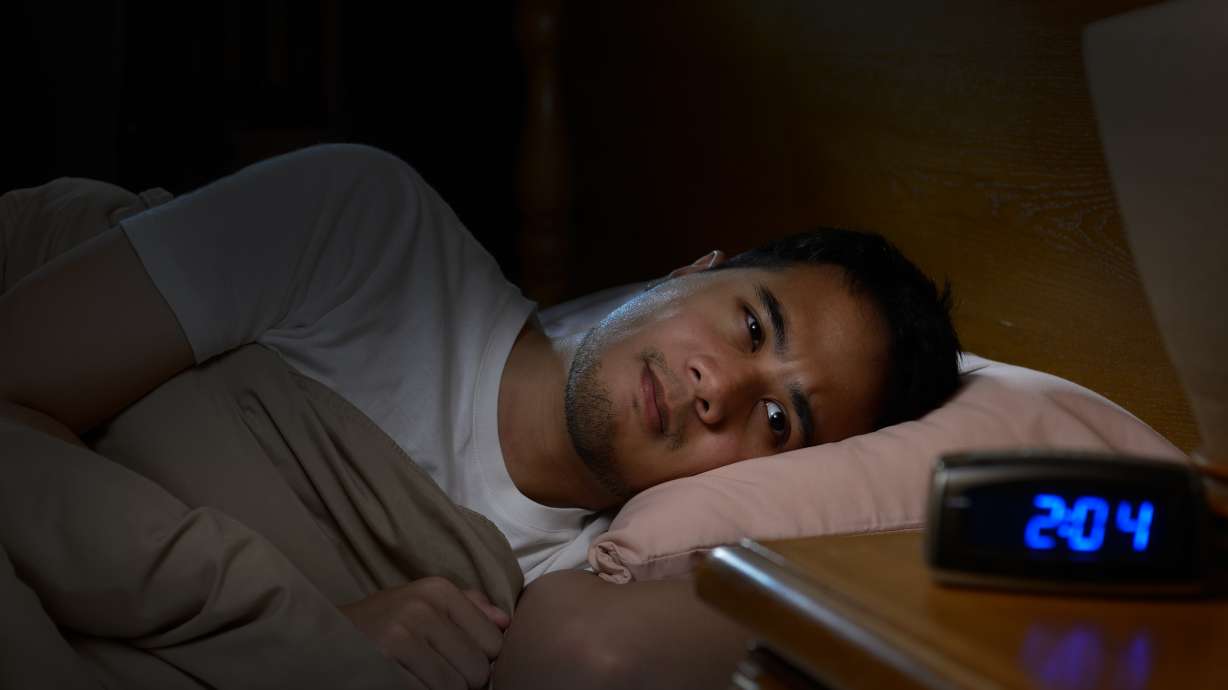Estimated read time: 4-5 minutes
This archived news story is available only for your personal, non-commercial use. Information in the story may be outdated or superseded by additional information. Reading or replaying the story in its archived form does not constitute a republication of the story.
PROVO — A psychology professor at BYU has found that insomniacs may be getting more sleep than they let on.
"New technology lets us look at all the regions of the brain and ask where there are differences between insomniacs and good sleepers," said Daniel Kay, clinical psychologist, sleep researcher and lead author of a study published in a special virtual issue of Sleep, the benchmark international journal for sleep and circadian science.
"We've found preliminary evidence that there may be regional differences in the brain — parts of the brain that remain awake when objective measures say they're asleep," he said.
Approximately 12 percent of the population has "clinically significant insomnia," Kay said. And, according to the Society of Behavioral Sleep Medicine, most everyone experiences at least a short bout of insomnia at some point during their lives.
As people age, sleep seems more difficult to accomplish, as about 30 percent in older generations have significant sleep disturbances such as sleep apnea, nightmares or other problems, for whatever reasons.
"We are so motivated to stay awake and there are so many exciting things to do in wakefulness, people just don't want to go to sleep," Kay said. "What ends up happening is that we are so motivated to work and do the things we enjoy, I think sleep gets neglected, particularly on the weekdays. And then we try to catch up on the weekends and that variability contributes to disturbances."
He suggests people try to have as regular a sleep schedule as possible for the best sleep health.
Data collected over the years, Kay said, has helped researchers discover the role of conscious awareness in the clinical definition of sleep, which is measured by brain wave patterns that can be observed. For example, when a person's brain shows low-amplitude, mixed-frequency waves and their eyes are moving or rolling around rapidly, the person has achieved sleep clinically.
The problem Kay has is that not everyone defines sleep in such an objectively measured way, but instead, probably associates sleep with a loss of awareness at some point and waking up refreshed.
Sleep aid:
"Science defines it one way and everyday people define it a different way," he said, adding that with something like insomnia, which is self-reported, it's hard to know how much sleep a person is actually getting. But most people are getting at least some sleep, even when they might think they're not.
"If a person weren't sleeping ever, we would see some pretty severe consequences," Kay said, adding that as a psychologist he's "willing to listen to patients and question the science," which may or may not be capable of detecting exactly what a person is complaining about.
His research has identified that some regions of the brain can be more active than others, even in sleep, meaning that whole brain doesn't sleep.
Kay has always been interested in sleep and recalls offering supposed dream interpretations to friends in high school.

"I'm fascinated with the idea that we spend one-third of our lives sleeping and it remains an enigma as to why we do that," he said. "There are obviously better uses of our time, so to speak."
He's interested in how the brain functions during sleep and how that might impact what people do and how they do things during the day, maybe even compensating in ways for a perceived lack of sleep. Kay plans on finishing his clinical hours to get official licensure and opening the first behavioral sleep medicine clinic in Provo later this year.
Insomnia and sleep disturbance, he said, can be treated, and the American College of Physicians recently recommended that cognitive behavioral therapy be the first line of treatment, as about 80 percent of people who follow instructions they are given are able to see improvements to their sleep.
And while it works, Kay said, there are few physicians trained to offer cognitive behavioral therapy in the right ways. The Society of Behavioral Sleep Medicine lists only one qualified therapist in the state of Utah, though Kay knows of at least one more.
I'm fascinated with the idea that we spend one-third of our lives sleeping and it remains an enigma as to why we do that. There are obviously better uses of our time, so to speak.
–Daniel Kay
The point is, because there aren't enough people trained to help many patients get medications, which work but have associated risks including addiction and dependency.
Kay's latest research, performed with co-authors from the University of Pittsburgh and the Medical University of South Carolina, suggests there might be other ways of dealing with insomnia in cases where traditional therapies aren't effective.
"It may be that only certain areas of the brain are not getting the restorative benefits of sleep," he said, adding that further research, including data from more patients, is needed to confirm his findings.
Hopefully, Kay said, clinicians like himself will soon be able to apply regional approaches instead treating a person's whole brain in terms of lost sleep.










